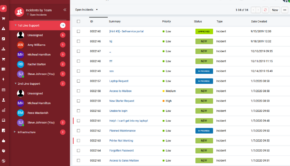The Impact Of Outsourcing Customer Support On Customer Satisfaction
According to the Deloitte Global Outsourcing Survey for 2022, companies outsource for several reasons. 57% of businesses outsource functions to save costs, while 51% go this route to access expertise. Nowhere on the list does any company mention improving customer satisfaction, and that is a little concerning.
After all, outsourcing can have a significant effect on client satisfaction. Whether that is a positive impact depends on the manner in which you implement and manage support and live chat outsourcing. It also depends on how much care you take when researching your service partner.
Therefore, in this article, we will look at a seldom-discussed topic, the impact of outsourcing support on customer satisfaction. Instead of focusing on the cost-saving benefits, we’ll take an objective look at the positives and potential negatives of outsourcing your client help desk.
The Positive Impacts of Live Support Outsourcing
The difference between success and failure here lies in choosing the right partner. We recommend carefully vetting the team with whom you will partner. It may be worth your while to go as far as conducting a thorough risk analysis on them so that you can better understand their operational strengths and weaknesses.
While this level of research is expensive, it sets the groundwork for a highly rewarding, lasting relationship that can bring several benefits.
Cost Savings
When you factor in the cost-to-company of recruiting, onboarding, and training new consultants, live chat outsourcing makes far more sense. Your team can work from anywhere, so why not take advantage of the expertise of consultants in countries where the cost of living is lower?
Expertise
Common wisdom holds that it takes 10,000 hours of practice to master any skill. Assuming that you train someone up from scratch and have them work 8-hour shifts, that means that it takes 1,250 days or 3.4 years for them to become experts in the field.
Can you afford to wait that long?
Multilingual Support
One reason that many companies are flocking to European outsourcing providers is their consultants’ abilities to speak multiple languages. This skill may prove helpful if your target audience is multicultural or if they live outside of your home country.
The Negative Impacts of Customer Support Outsourcing
You can minimize these by carefully vetting vendors before signing up for their services. You need to be aware of the following potential disadvantages to make the best possible decision.
Language and Cultural Barriers
Many companies choose offshore providers to cut costs. The danger of doing so is that language or cultural challenges might develop. Such misunderstandings, while nobody’s fault, may frustrate clients.
Lack of Product Knowledge
Your employees should understand your product back to front because they work with it all the time. An outsourced consultant does not have the same level of exposure and experience. However, this may be easily solved by using a dedicated rather than a shared team.
Quality Control Issues
Most outsources keep careful tabs on their consultants to ensure outstanding service delivery. However, it’s also worth running random checks yourself to ensure that your clients receive consistent quality.
Security and Privacy Concerns
Entrusting your client’s sensitive data to a third party is nerve-wracking, particularly with the ever-increasing rate of data breaches over the past few years. However, the right service partner can enhance your security by using high-level encryption that you do not have access to.
Conclusion
There is no way to ensure that an outsourcing partnership will improve customer satisfaction. However, you can increase the odds of success significantly by working with the right firm. Unfortunately, there are no shortcuts here, so you must perform diligent research before settling on a candidate company.

















